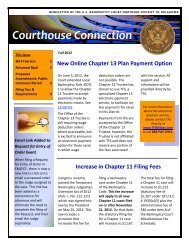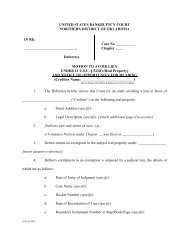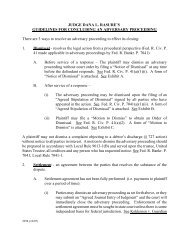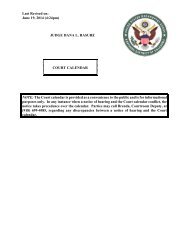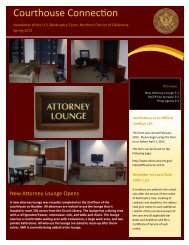The Published Opinions of Judge Terrence L. Michael
The Published Opinions of Judge Terrence L. Michael
The Published Opinions of Judge Terrence L. Michael
You also want an ePaper? Increase the reach of your titles
YUMPU automatically turns print PDFs into web optimized ePapers that Google loves.
significant balloon payment, there is a presumption under 11 U.S.C. §<br />
524(m)(1) that the agreement imposes an undue hardship on the<br />
debtor. In order to overcome this presumption, the debtor must<br />
provide evidence <strong>of</strong> his or her ability to meet the obligation due under<br />
the agreement at the time it falls due. A creditor’s promise to<br />
renegotiate the debt in the future is not sufficient to overcome the<br />
presumption. In addition, where a debtor’s monthly budget is<br />
insufficient to make the required payments under the agreement,<br />
something more than an unsupported statement that a third party will<br />
make the payments is required for the Court to find that the agreement<br />
does not impose an undue hardship on the debtor.<br />
83. In re Crowl, 415 B.R. 849 (Bankr. N.D. Okla. 2009). Case No. 08-11529-M.<br />
ISSUE: Whether an annuity was properly claimed as exempt under Oklahoma<br />
law by the named beneficiary <strong>of</strong> the annuity.<br />
RULING: Yes. <strong>The</strong> plain language <strong>of</strong> Oklahoma Statutes title 36, § 3631.1<br />
states that any payments made to a beneficiary “under any plan or<br />
program <strong>of</strong> annuities and benefits” shall be fully exempt in a<br />
bankruptcy proceeding <strong>of</strong> the beneficiary. <strong>The</strong> Court found that upon<br />
stipulation by the chapter 7 trustee that the financial product at issue<br />
was in fact an annuity, the inquiry ended. Citation to the Court <strong>of</strong> case<br />
law from other jurisdictions that invoked different statutory language<br />
did not persuade the Court that the outcome should be otherwise.<br />
84. Miller v. Dow (In re Lexington Oil & Gas Ltd.), 423 B.R. 353 (Bankr. E.D. Okla. 2010).<br />
Case No. 08-80228; Adv. No. 08-08029.<br />
ISSUE: Whether alleged loans made at the inception <strong>of</strong> a fledgling company<br />
so that it could acquire a vital piece <strong>of</strong> collateral should be<br />
recharacterized as equity contributions, for purposes <strong>of</strong> the trustee’s<br />
effort to avoid the repayment <strong>of</strong> the alleged loans as fraudulent<br />
transfers.<br />
RULING: <strong>The</strong> Court held that promissory notes made to acquire a key piece <strong>of</strong><br />
collateral at firm’s inception should be recharacterized as equity<br />
contributions based on the facts <strong>of</strong> this case. <strong>The</strong> Court determined<br />
that the transaction was in reality an attempt to acquire equity in a<br />
corporation while avoiding the risks attendant thereto. Later efforts to<br />
“re-paper” the original notes failed for lack <strong>of</strong> consideration and did not<br />
create valid security interests in the collateral. Payments made<br />
pursuant to those promissory notes after the sale <strong>of</strong> the collateral were<br />
found to be constructively fraudulent under Oklahoma law, and<br />
therefore avoidable by the trustee. <strong>The</strong> defendants were ordered to<br />
34



